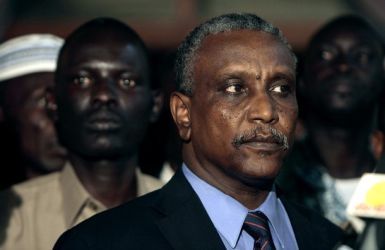SPLM-N’s Arman denies talks with Sudan ruling party
April 7, 2012 (KHARTOUM) — Yasir Arman, the Secretary General of Sudanese rebels the Sudan People’s Liberation Movement–North (SPLM-N), has dismissed reports about talks with Khartoum’s government stressing they are determined to topple the Sudanese regime.

According to the sources, Khartoum accepted the offer but stipulated that it would only talk to the SPLM-N deputy chairman Abdel Aziz Al-Helu who leads the SPLM-N in the South Kordofan State.
Speaking to Sudan Tribune, Arman said rumours about ongoing arrangements for talks between the Sudanese government and the SPLM-N are just “a Joke”, adding they reject any talks on South Kordofan alone.
Arman disclosed that they informed all the mediators of their rejection to a partial solution stressing that they want a comprehensive process to settle all the crises of the country with the participation of all the Sudanese forces including the National Congress Party (NCP).
The SPLM-N and three rebel groups operating in Darfur formed the Sudan Revolutionary Front (SRF) earlier this year, which aims to overthrow the NCP’s regime last November. Since the alliance was formed the SPLM-N and the other Darfur rebels have refused to continence separate regional talks with Khartoum.
In July last year the SPLM-N signed a deal with a senior NCP official, Nafi Ali Nafi, but when he returned to Khartoum it was discarded by Sudanese president Omar Al-Bashir.
The SRF forces say they are determined to bring down the regime by political and military means. Since February they intensified their joint attacks against the government forces mainly in South Kordofan State.
“The experience has demonstrated that it is an elusive party refusing comprehensive and equitable solutions, and all what we have is to topple it because (the NCP) did not allow any other way and reject all solutions,” he added.
Arman further said they are working on ways to gather the armed groups, political parties and civil society groups under one umbrella expressing hopes to succeed in these efforts, as they did with the Darfur armed groups, in order to throw out the regime.
He said Bashir’s regime, “should join the regimes of Ben Ali, Mubarak and Gaddafi. It is even worse than these regimes because it divided Sudan into two states and if it continues it will tear up the remaining of Sudan.”
South Sudan seceded from north Sudan last year after the SPLM shared power with the NCP for six years. The SPLM campaign for independence arguing that the experience of working with the regime in the Government of National Unity had not made the option of unity attractive.
Around 98% of South Sudanese voted for independence. This left SPLM supporters and soldiers in South Kordofan and Blue Nile north of the border and still governed by Khartoum. Contentious elections, failure to implement the 2005 peace deal and Khartoum’s demand that they disarm led to the conflict erupting first in South Kordofan in June and then two months later in Blue Nile.
Arman, in his interview with the Sudan Tribune on Friday, said he was confused by Khartoum’s insistence that Juba should admit its support to the Sudanese rebels before inking agreements between the two countries brokered by an African Union mediation panel.
“This is puzzling and strange that some quarters in Khartoum does not seek only to resolve issues with Juba but demanding Juba to solve the problems of the Republic of Sudan.”
Sudan and South Sudan regularly trade accusations of supporting rebel groups from both sides. The African Union mediation believes that the South Kordofan conflict is impacting negatively on its efforts to settle the outstanding issues between Sudan and newly independent South Sudan.
After Al-Bashir rejected the July 2011 framework agreement the war extended to Blue Nile State where a the SPLM governor, Malik Aggar, was removed from office and his troops forced to retreat to the Sudan’s southern border with Sudan Sudan and Ethiopia.
SPLM-N secretary general urged the Sudanese officials to recognise their failure in the Blue Nile and South Kordofan as they failed in Darfur. To settle this crisis he said, the Sudanese people should be consulted and asked their opinion on this question posed since 1956 “how to govern Sudan?”
(ST)
